Edit: I only see now that most if not all of the points were already made in the comments, but since I provide links and excerpts I leave the answer here. What I think is the answer comes right at the end of this lengthy post.
Edit 2: Added some formatting, minor corrections.
Disclaimer: This is not a definitive answer but I traced the German word Integritätsbereich through some famous older texts in German and I reproduce here what I found. It essentially confirms what Bill Dubuque said in several comments. Let me stress that I only looked in the most obvious places, so there may be earlier usages or better references than the ones I give here:
1. Early usage in the sense of algebraic integers
In Hilbert's Zahlbericht (1897) we find the following passage (unfortunately I can't access the English translation, so I hope German will do), which I'm reproducing from page 121 of volume 1 of his collected works (Göttinger Digitalisierungszentrum GDZ):
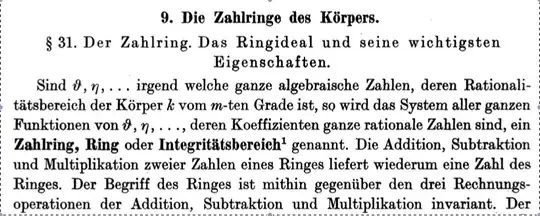
The footnote to Integritätsbereich reads: Nach Dedekind "eine Ordnung".
As Bill Dubuque pointed out in a comment, the term Rationalitäts-Bereich appears in Kronecker's Grundzüge einer arithmetischen Theorie der algebraischen Grössen (1882) and there is the following passage mentioning Integritäts-Bereich (reproduced from archive.org) on pages 14 and 15:
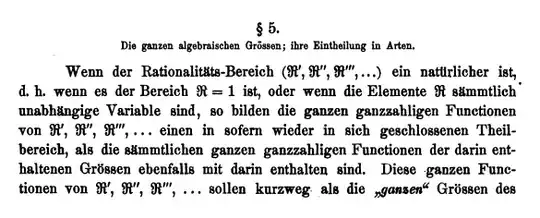
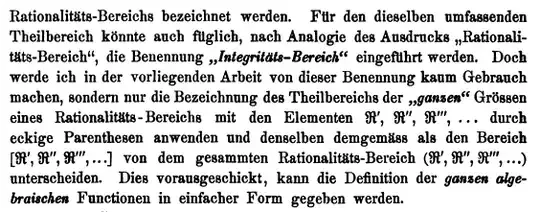
As far as I can tell, Kronecker stuck to his intention of not using "Integritäts-Bereich" and I found it only mentioned once more at the beginning of § 22 on page 84.
For the sake of completeness: Hilbert also mentions Rationalitätsbereich and refers to Kroneckers work above as well as to Dedekind's Supplement XI to Dirichlet's Vorlesungen über Zahlentheorie, titled Über die Theorie der ganzen algebraischen Zahlen, available in volume 3 of Dedekind's collected works (GDZ) both in German and in French. As far as I can tell the word Integritätsbereich is not mentioned there (as Hilbert mentions the word Ordnung is used instead) but, incidentally, we find Zahlkörper, rationale ganze Zahlen, and, of course algebraische ganze Zahlen (and many more terms) used in precisely the same way as they are used today.
2. Modern usage
The modern abstract notion can be found in Emmy Noether's work (where else?), for example in Idealtheorie in Ringbereichen, Math. Annalen 83 (1921), 24–66 (the underlined text appears this way in Springer's online edition).
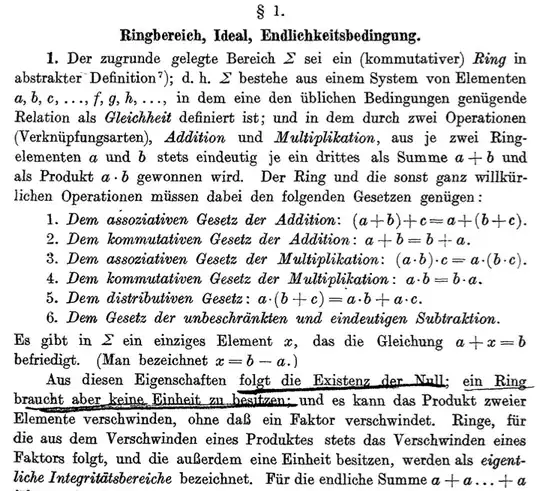
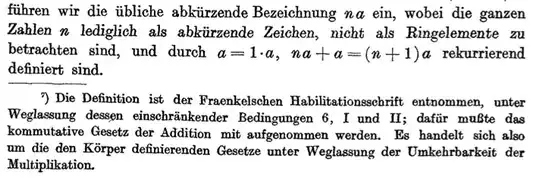
Of course, this doesn't explain why exactly this property of algebraic integers should be isolated, not something else but maybe that's something that only Emmy Noether herself could answer.
Added: A. Fraenkel, Über die Teiler der Null und die Zerlegung von Ringen, Journal für die reine und angewandte Mathematik (Crelle's Journal) 145 (1915), 139–176 contains the following passage:

The fact that an integral domain embeds into its field of fractions which is constructed in analogy with the construction of the rational numbers out of the integers is explicitly mentioned here. This seems a reasonable explanation for the choice of terminology which allows us to think of the elements of an integral domain as integers in some field. Of course, the term "ganze Zahl" (integer, literally: "entire number") is to be understood as "not a real fraction", that is: a fraction representable as $r/1$ with $r$ an element of the domain $R$.
In fact [slightly paraphrasing], Fraenkel even goes so far as to say that the ring properties of an integral domain are only artificial ("nur künstlich") and inherited from a surrounding field, as opposed to a ring with zero divisors which is deemed to posses a natural ("natürlich") structure of a ring. This also explains why "Integritätsbereich" is only mentioned this one time in the entire paper.
There is also a detailed discussion of the axioms of rings, quite close to what one finds in any basic algebra text nowadays.





